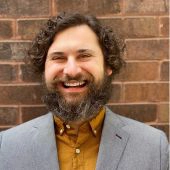Collaborative Climate Innovation
Trienens Institute Co-Executive Director Ted Sargent shares insights on Northwestern's role in driving research, partnerships to expand carbon removal initiatives
Year-long fellowship will bring additional lifecycle assessment resources to Northwestern community
Sustainable design expert Craig Arnold has been appointed as an adjunct professor and fellow in the Paula M. Trienens Institute for Sustainability and Energy for the 2024 calendar year. Arnold most recently led environmental impact analysis at Watershed, a San Francisco-based software development company that supports corporations in measuring and reporting their emissions. In his role, he enabled companies to reduce their carbon footprint through transformational design, lifecycle assessments (LCA), and process modeling.
Lifecycle assessments are a key sustainability tool; they provide a quantitative calculation of a product’s total environmental impact, allowing for clearer and more accurate comparisons between virtually every p
roduct-based choice society can make. LCAs measure the emissions—the environmental cost—of that product at each stage of its usage journey, including its conception, lifespan, and, ultimately, its disposal.

Among Arnold’s responsibilities as an Institute fellow, he will teach the ISEN 495 Life Cycle Assessment: Business Applications and serve as a guest speaker for other sustainability-related courses.
“Craig will bring a practitioner’s mindset to our classrooms, an important perspective the Trienens Institute strives to contribute to our students’ experience,” said Holly Benz, director of the Master of Science in Energy and Sustainability Program (MSES). “His applied background in process modeling and lifecycle assessment will provide students with the skills to apply cutting-edge quantitative frameworks to evaluate sustainability.”
As an expert on lifecycle assessment and sustainable design, Arnold will also serve as an internal resource—including conducting training sessions with faculty and graduate students and research groups, contributing to grant work and authoring a case study on lifecycle assessment for classroom use based on familiar household products.
“In my courses I define sustainability as the ability to meet the needs of the present without sacrificing the ability to meet the needs of the future, and the unfortunate reality is we as a society have done a decent job at the former without much concern for the latter,” Arnold said. “As such, it’s incredibly important that academia trains a wide range of individuals on energy, sustainability, and sustainable thinking—without skilled professionals in a number of fields well-versed in these subjects, we can’t change the status quo quickly or drastically enough to meet our obligations to the future.”
Arnold has acquired over a decade of experience in corporate sustainability strategy and environmental compliance and policy. Prior to his work at Watershed, Arnold was a senior environmental design engineer at Apple, where he spent eight years developing lifecycle assessment models for key manufacturing processes, coordinated supplier data collection and carbon mitigation projects, and managed international environmental compliance for iPad projects.
As Northwestern’s research groups continue to progress in the development of more sustainable materials and processes, lifecycle assessment (LCA) answers questions about how environmental impacts of new technology compares with traditional methods.
“This is an area where LCA can help—it can quantify impacts, identify potential benefits, and provide evidence of said benefits to the broader community,” Arnold said.
His background in technology and design, paired with his interdisciplinary collaboration, will provide new opportunities for students, and enhance the Trienens Institute’s endeavors in both research and instruction.
In complement to his new role, Arnold will maintain his work with the University of Minnesota’s Timothy Smith, professor of sustainability systems, and his company, TASA Analytics. TASA Analytics is a research and advisory firm that improves actionable academic-practitioner collaboration, supporting Fortune 500 and nonprofit clients alike in greenhouse gas accounting, climate change mitigation and sustainability standards.
Since 2022, he has taught Sustainability in the Product Development Process at the McCormick School of Engineering’s Segal Design Institute, for its Masters of Product Design and Development Management. Arnold earned his bachelor’s degree in physics from the University of Michigan, and his master’s in mechanical engineering from Northwestern University, where he specialized in energy and sustainability.